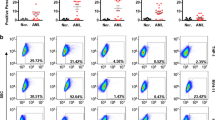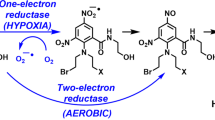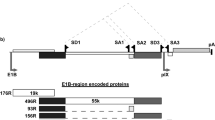Abstract
Virus-directed enzyme prodrug therapy utilizing the bacterial enzyme nitroreductase delivered by a replication-defective adenovirus vector to activate the prodrug CB1954 is a promising strategy currently undergoing clinical trials in patients with a range of cancers. Similarly, selectively replicating oncolytic adenoviruses are entering clinical trials. An understanding of interactions between vector and target cell are critical to the development of these strategies. We demonstrate that adenovirus vectors activate cellular pathways that promote cell survival in an NF-κB-dependent manner, and consequently have a negative effect on the efficacy of cell killing induced by cancer gene therapy strategies. This provides a potential therapeutic target to enhance the cytotoxicity of these approaches.
This is a preview of subscription content, access via your institution
Access options
Subscribe to this journal
Receive 12 print issues and online access
$259.00 per year
only $21.58 per issue
Buy this article
- Purchase on Springer Link
- Instant access to full article PDF
Prices may be subject to local taxes which are calculated during checkout








Similar content being viewed by others
References
Palmer DH, Mautner V, Kerr DJ . Clinical experience with adenovirus in cancer therapy. Curr Opin Mol Ther 2002; 4: 423–434.
Khuri FR et al. A controlled trial of intratumoral ONYX-015, a selectively-replicating adenovirus, in combination with cisplatin and 5-fluorouracil in patients with recurrent head and neck cancer. Nat Med 2000; 6: 879–885.
Chung-Faye G et al. Virus-directed, enzyme prodrug therapy with nitroimidazole reductase: a phase I and pharmacokinetic study of its prodrug, CB1954. Clin Cancer Res 2001; 7: 2662–2668.
Palmer DH et al. Virus-directed enzyme prodrug therapy: intratumoral administration of a replication-deficient adenovirus encoding nitroreductase to patients with resectable liver cancer. J Clin Oncol 2004; 22: 1546–1552.
Chen MJ et al. Enhanced efficacy of Escherichia coli nitroreductase/CB1954 prodrug activation gene therapy using an E1B-55K-deleted oncolytic adenovirus vector. Gene Therapy 2004; 11: 1126–1136.
Melotti P et al. Activation of NF-kB mediates ICAM-1 induction in respiratory cells exposed to an adenovirus-derived vector. Gene Therapy 2001; 8: 1436–1442.
Tamanini A et al. MAP kinases and NF-kappaB collaborate to induce ICAM-1 gene expression in the early phase of adenovirus infection. Virology 2003; 307: 228–242.
Clesham GJ et al. High adenoviral loads stimulate NF kappaB-dependent gene expression in human vascular smooth muscle cells. Gene Therapy 1998; 5: 174–180.
Lieber A et al. The role of Kupffer cell activation and viral gene expression in early liver toxicity after infusion of recombinant adenovirus vectors. J Virol 1997; 71: 8798–8807.
Morelli AE et al. Recombinant adenovirus induces maturation of dendritic cells via an NF-kappaB-dependent pathway. J Virol 2000; 74: 9617–9628.
Palmer DH, Milner AE, Kerr DJ, Young LS . Mechanism of cell death induced by the novel enzyme-prodrug combination, nitroreductase/CB1954, and identification of synergism with 5-fluorouracil. Br J Cancer 2003; 89: 944–950.
Schuurhuis GJ, Oberink JW, Bontje PM, Broxterman HJ . The PGP specific combination Syto® 16/PSC833 detects early apoptosis in CD34 positive progenitor cells. Exp Hematol 1997; 25: 754.
Teramoto S et al. Effect of adenoviral vector infection on cell proliferation in cultured primary human airway epithelial cells. Hum Gene Ther 1995; 6: 1045–1053.
Brand K et al. Induction of apoptosis and G2/M arrest by infection with replication-deficient adenovirus at high multiplicity of infection. Gene Therapy 1999; 6: 1054–1063.
Wersto RP, Rosenthal ER, Seth PK, Eissa NT, Donahue RE . Recombinant, replication-defective adenovirus gene transfer vectors induce cell cycle dysregulation and inappropriate expression of cyclin proteins. J Virol 1998; 72: 9491–9502.
Milner AE et al. Induction of apoptosis by chemotherapeutic drugs: the role of FADD in activation of caspase-8 and synergy with death receptor ligands in ovarian carcinoma cells. Cell Death Differ 2002; 9: 287–300.
Wang CY et al. NF-kappaB antiapoptosis: induction of TRAF1 and TRAF2 and c-IAP1 and c-IAP2 to suppress caspase-8 activation. Science 1998; 281: 1680–1683.
Lundqvist A et al. Recombinant adenovirus vector activates and protects human monocyte-derived dendritic cells from apoptosis. Hum Gene Ther 2002; 13: 1541–1549.
Wang S et al. Loss of the bcl-2 phosphorylation loop domain increases resistance of human leukemia cells (U937) to paclitaxel-mediated mitochondrial dysfunction and apoptosis. Biochem Biophys Res Commun 1999; 259: 67–72.
You Z et al. Nuclear factor-kappa B-inducible death effector domain-containing protein suppresses tumor necrosis factor-mediated apoptosis by inhibiting caspase-8 activity. J Biol Chem 2001; 276: 26398–26404.
Datta SR et al. Akt phosphorylation of BAD couples survival signals to the cell-intrinsic death machinery. Cell 1997; 91: 31–41.
Datta SR, Brunet A, Greenberg ME . Cellular survival: a play in three Akts. Genes Dev 1999; 13: 2905–2927.
Author information
Authors and Affiliations
Rights and permissions
About this article
Cite this article
Palmer, D., Chen, MJ., Searle, P. et al. Inhibition of NF-κB enhances the cytotoxicity of virus-directed enzyme prodrug therapy and oncolytic adenovirus cancer gene therapy. Gene Ther 12, 1187–1197 (2005). https://doi.org/10.1038/sj.gt.3302510
Received:
Accepted:
Published:
Issue Date:
DOI: https://doi.org/10.1038/sj.gt.3302510
Keywords
This article is cited by
-
Inhibition of the Inflammatory Cytokine TNF-α Increases Adenovirus Activity in Ovarian Cancer via Modulation of cIAP1/2 Expression
Molecular Therapy (2011)
-
Active site dynamics in NADH oxidase from Thermus thermophilus studied by NMR spin relaxation
Journal of Biomolecular NMR (2011)



